|
BoC bid to create model agricultural village:
Doramadalawa's bid to become an exemplary village
By Ranil WIJAYAPALA
|
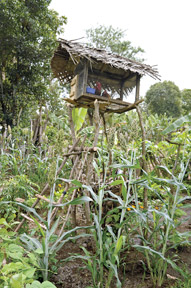
Innovative methods used
|
For many Sri Lankans the name 'Doramadalawa' has a significant value
whether it is due to their knowledge of history or due to the frequent
use of this name in a popular TV program, but for more than 200 families
living in the village Doramadalawa in the Anuradhapura district, the
name of their village had no significance.
They are aware that they live in a historic village, that provided
protection to King Pandukabhaya in his childhood from his uncles who
wanted to see his blood, fearing their annihilation as they daily see
the cave temple and the historic Devalaya in the centre of Doramadalawa
village, but it does not make them proud as they are not the ancestral
villagers living in that historic village.
Historical
Today these villagers are proud, not only for living in a village
with a historical value, but due to their ability to transform that
village into one of the outstanding villages to set an example to the
entire country.
They have become outstanding people not because they are engaged in
agricultural activities but they have become real movers to change the
typical picture of a village dependent on chena cultivation, into a
village that can generate all kinds of crops and share the excess with
the other villagers.
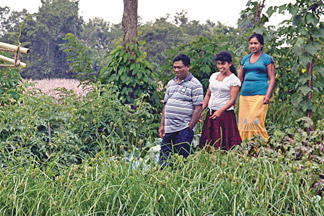
Dharmasiri with his family in their garden |
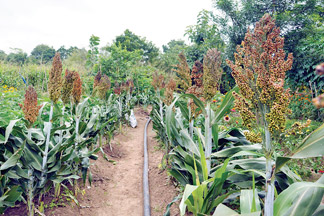
Grains cultivations |
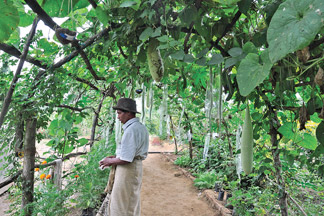 |
| Wimalasena in his garden |
Anyone who could visit this hamlet located some three kilometres
interior from the 136th kilometre post on the A-9 road after passing
Mihintale town, and have a glimpse on their home gardens, may wonder
whether they are actually in Raja Rata or in any other part of the
country.
If not for the accidental meeting of Upali Ratnamalala attached to
Bank of Ceylon, Doramadalawa village during my visit to Anuradhapura to
cover Deyata Kirula exhibition, I too would not have been aware of the
villagers achievements.
Though it was an accidental visit it gave me an inspiring and
refreshing experience about these villagers who had made the impossible
things possible even under most difficult circumstances.
Bank of Ceylon, which had become a tower of strength to the entire
Sri Lanka, has also become a strength to these villagers as it was the
bank which had backed and guided them after introducing these new
concepts to the people in their bid to do something worth for the
country parallel to Deyata Kirula exhibition held in Oyamaduwa in
Anuradhapura.
The concepts introduced by the 'Divi Neguma' program introduced by
the Economic Development Ministry throughout the country has become a
practical reality in Doramadalawa village as a result of the efforts
made by the BoC to create a model agricultural village consisting of
self-sufficient domestic units becoming a ground reality there.
The project has been initiated by the BoC in the mid of last year
with the hope that Mihintale area will become the centre for Deyata
Kirula exhibition. Although, the venue of the exhibition is shifted to
Oyamaduwa in the western part of Anuradhapura district, the BoC did not
leave their project in Doramadalawa.
To make this vision a reality, the people of this village who had to
depend on rain water for their cultivations despite they live in Raja
Rata famous for massive tanks meant for agricultural purposes had to
stand against all odds they had to face in their life.
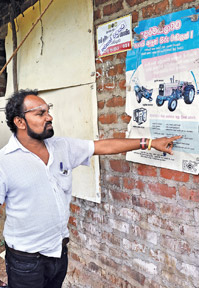
Upali Ratnamala, BoC Coordinator of the program |
"What they needed was the guidance, knowledge to go ahead with the
program and also the financial assistance to clear the small bottlenecks
that had prevented them from making big strides in their lives at the
most needed hour in their life", Upali Ratnamalala, the co-ordinating
officer to this program from the BoC said.
Though there are signs to say that these people have benefited from
some programs like rain water harvesting and other agricultural wells
programs initiated by government or non-governmental organisations, it
is apparent that those programs could not make any change in their
lives. Thus all those structures they have created in their lands also
becoming a burden to them.
However, it also became an advantage for Doramadalawa people as BoC
was searching for a village that has many challenges to overcome when
they implement this project to create a model agricultural village under
a concept of BoC Chairman, Dr. Gamini Wickremasinghe and under the
guidance of Additional General Manager C. Samarasinghe.
"We get a diverse section of people there in Doramadalawa solely
dependent on agriculture but ignorant of modern agricultural methods.
Therefore it became a big challenge for the BoC to implement this
program with a set of people having different knowledge levels and
diverse political views", Ratnamalala added.
Requirements
According to the background of various people the BoC was able to get
the participation of 157 families to the program.
What BoC needed was to develop all home gardens in Doramadalawa into
gardens that can provide all basic food requirements of the family.
To help people of Doramadalawa and to achieve this objective, BoC
provided the expert knowledge of retired Deputy Director of the
Agriculture Department K.L. Jayatissa and retired Agriculture Officer I.
D. Jayasena.
At the initial stage the families who were willing to participate in
the program were put into groups making it easy for all.
One of the major problems they had in Doramadalawa was lack of water
for the cultivation and many people had to depend on the agricultural
wells to cultivate their lands. But many of them were not in a position
to properly construct their agricultural wells and maintain them to make
use of them effectively.
"When we came here in May 2011 only about 35 agricultural wells were
available for all 200 families living there. Many of them were not
properly maintained. Therefore, we decided to provide them loans to have
agricultural wells with the help of the water resources board",
Ratnamalala added.
With the implementation of that program more than 80 agricultural
wells are now available in the village to provide much needed water for
their cultivations, solving a long felt need of the people.
"Without solving the water problem, the implementation of this
project would have been a remote dream for us", Ratnamalala added.
Prior to initiating the program all the participants were taken to
Gannoruwa Agriculture Research Institute to have workshop there in two
groups and give them an idea what they have to do in their gardens.
Nearly 157 families who are participating in this program have made a
visible change in their home gardens, making them more attractive. Even
the places they earlier thought that no crop would grow had been turned
into attractive vegetable beds.
Boutique
Swarna who used to run a boutique has made a big change in her garden
after cultivating many crops which she earlier thought will never grow
in their gardens. "Now we are growing carrot, beet, leeks and other
crops also in our garden. We did not think that it would be successful
but today we have realised that we can grow any crop here without any
problem if we have determination to cultivate them", she added.
The 49 year old Wimalasena, better known as Raja in Doramadalawa
village, also a participant in this program who successfully cultivated
many crops in his garden. After becoming resident in Doramadalawa six
years back he had many difficulties when cultivating his lands.
Wimalasena, along with his wife Priyantha Nalini used to draw water from
the well and cultivate their lands which turned out to be a very
difficult exercise for them.
"After we joined this program the BoC provided us a Rs.200,000 to
construct this agriculture well and to buy a water pump. Now we can
cultivate our lands easily, making use of the agriculture well", he
added.
The garden of Wimalasena is very rich with all kinds of crops,
different varieties of the grains, yams and also herbal plants. His
innovative methods used in cultivating different kinds of crops has made
his home garden a very attractive one.
"Earlier we used to cultivate vegetables and other crops in paddy
lands. Now we get the assistance of the agriculture officials when
growing these vegetables and create different types of beds for
different crops and it has become successful", he added.
Like Wimalasena, Mahinda Gunawardhana and his wife Chamila and the
family of Dharmasiri too has shown very good results in their home
gardening project, apart from engaging in large scale cultivations which
they used to do as their livelihood.
The home garden of Dharmasiri which was used to dump metal has now
turned into a nice gardens full of crops making use all the waste
created in the house. It has also helped them to keep their home and the
garden clean as they are making use of everything for cultivations.
They all have made use of all available resources to turn their lands
into an attractive place.
One of the main features in their cultivations is the non usage of
fertiliser other than compost they have produced in their own gardens.
As insecticides also they can use only natural things.
K.L. Jayatissa who is guiding the villagers to cultivate their home
gardens with his knowledge, said that many people are following the
methods he has introduced.
"I had to start from zero level as they had no basic knowledge about
cultivations other than their traditional knowledge. We have now come a
long way and now we are in the climax of our program", he added.
"We launched this program as a competition and who have come out with
innovative methods will be rewarded by the BoC. Out of 157 families 130
will receive prizes for their contribution", he added.
The BoC has made arrangements to create a market for their crops also
by making arrangements to collect the excess crops and vegetables and
sell them to the government institutions and banks in Mihintale area.
"We have provided a loan to a person in Doramadalawa to buy a Dimo
Batta vehicle and collect all vegetables from households. After
collecting them we create bags consisting of 250 grams of green chilli,
500 grams of tomato, 500 grams of beans, snake goad and green leave in
one bag and sell them at Rs.180 each. There is a big demand for that
also as we are selling organic vegetables to our customers through this
project", Ratnamalala added.
BoC Doramadalawa branch equipped with all facilities including
Automated Teller Machine located in front of Doramadalawa Raja Maha
Viharaya has become a vibrant centre for the people in Doramadalawa to
get financial assistance to solve their problems.
"We have given different kinds of loans to the tune of Rs.35 million
from this branch to upgrade the living standard of the people in
Doramadalawa. They have shown a progress in their repayment also during
the past few months since we open this new branch", Ratnamalala added.
In the days to come, the BoC will also open 'Divimansala' a centre to
guide the villagers to learn the market prices from their village itself
so that they can market their crops also at the available market prices.
|

